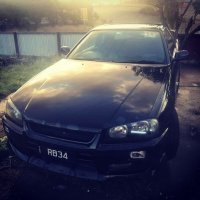Announcements
-
Similar Content
-
Latest Posts
-
List all of your mods. It sounds like an aftermarket ECU hitting rev limiter. Like a valet mode, or a cold rpm limiter?
-
@Kapr Haha yeah thats the one. I missed that you had a built up engine, I wouldn't want to run it on there either then. It was good in my situation just to replace the original turbo on a stock engine. @MBS206Yep definitely not a replacement for anything name brand
-
You are selling this? I have never bought something from marketplace...i dont know if i trust that enough. And the price is little bit "too" good...
-
By Watermouse · Posted
https://www.facebook.com/share/19kSVAc4tc/?mibextid=wwXIfr -
It would be well worth deciding where you want to go and what you care about. Reliability of everything in a 34 drops MASSIVELY above the 300kw mark. Keeping everything going great at beyond that value will cost ten times the $. Clutches become shit, gearboxes (and engines/bottom ends) become consumable, traction becomes crap. The good news is looking legalish/actually being legal is slighly under the 300kw mark. I would make the assumption you want to ditch the stock plenum too and want to go a front facing unit of some description due to the cross flow. Do the bends on a return flow hurt? Not really. A couple of bends do make a difference but not nearly as much in a forced induction situation. Add 1psi of boost to overcome it. Nobody has ever gone and done a track session monitoring IAT then done a different session on a different intercooler and monitored IAT to see the difference here. All of the benefits here are likely in the "My engine is a forged consumable that I drive once a year because it needs a rebuild every year which takes 9 months of the year to complete" territory. It would be well worth deciding where you want to go and what you care about with this car.
-








Recommended Posts
Create an account or sign in to comment
You need to be a member in order to leave a comment
Create an account
Sign up for a new account in our community. It's easy!
Register a new accountSign in
Already have an account? Sign in here.
Sign In Now